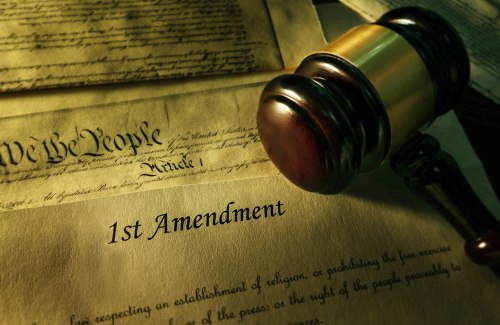Suit claims anti-bias ethics rule infringes lawyer's free speech rights

Image from Shutterstock.com.
A Philadelphia lawyer has filed a First Amendment challenge to Pennsylvania’s new ethics rule barring manifestations of bias or prejudice in the practice of law.
Lawyer Zachary Greenberg contends that the ethics rule will chill his speech as a lawyer for the Foundation for Individual Rights in Education, which defends due process and free speech rights of students and faculty.
Law360 and Law.com have coverage of Greenberg’s Aug. 6 lawsuit; a press release is here.
Speaking at legal events, Greenberg has endorsed due process protections for students accused of sexual misconduct, has opposed campus bans on hate speech, has defended the right of professors and students to engage in hateful speech, and has spoken in favor of allowing religious speech on campus that espouses discriminatory views.
The new ethics rule could lead to a sanction against Greenberg “if an audience member misconstrues his speech as a manifestation of bias or prejudice,” the lawsuit says.
The Pennsylvania Supreme Court adopted Rule 8.4(g) of the Pennsylvania Rules of Professional Conduct on June 8.
Pennsylvania’s rule, set to take effect Dec. 8, is a variation of Rule 8.4(g) of the ABA Model Rules of Professional Conduct. The ABA adopted the bias rule in 2016.
The Pennsylvania version of the rule says it is professional misconduct for a lawyer to “in the practice of law, by words or conduct, knowingly manifest bias or prejudice, or engage in harassment or discrimination, as those terms are defined in applicable federal, state or local statutes or ordinances, including but not limited to bias, prejudice, harassment or discrimination based upon race, sex, gender identity or expression, religion, national origin, ethnicity, disability, age, sexual orientation, marital status or socioeconomic status. This paragraph does not limit the ability of a lawyer to accept, decline or withdraw from a representation in accordance with Rule 1.16. This paragraph does not preclude advice or advocacy consistent with these rules.”
A comment to the Pennsylvania rule says “conduct in the practice of law includes participation in activities that are required for a lawyer to practice law, including but not limited to continuing legal education seminars, bench bar conferences and bar association activities where legal education credits are offered.”
The suit says Greenberg reasonably fears that his writing and speeches could be misconstrued. Even U.S. Supreme Court justices have been criticized as potentially biased for opinions and comments, the suit says.
Among those criticized:
• The late Justice Antonin Scalia was criticized for a discussion of mismatch theory that contends that university racial preferences harm minorities with lower academic credentials.
• Justice Clarence Thomas has been criticized as homophobic in his opinions.
• Justice Samuel A. Alito Jr. was accused of manifesting a “jurisprudence of white racial innocence.”
• Justice Brett M. Kavanaugh was accused of writing an opinion that peddles “class prejudice.”
• Justice Ruth Bader Ginsburg was criticized as borderline prejudiced when she referred to civil rights activist and football quarterback Colin Kaepernick’s national anthem protests as “dumb and disrespectful.”
The suit alleges that the Pennsylvania ethics rule unconstitutionally infringes Greenberg’s free speech rights and is “unconstitutionally vague.”
Greenberg is represented by the Hamilton Lincoln Law Institute, a nonprofit law firm that advocates for free markets, limited government and free speech.



